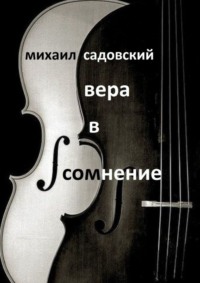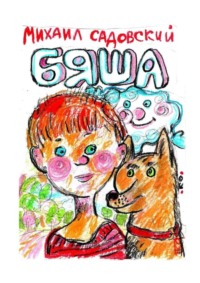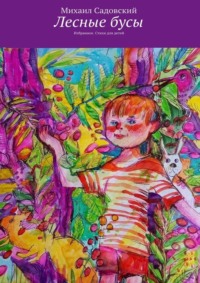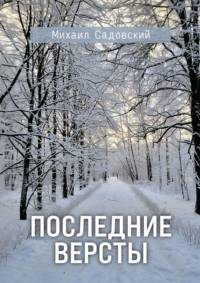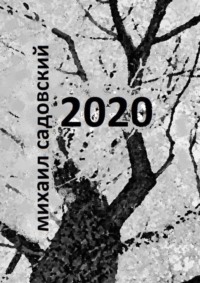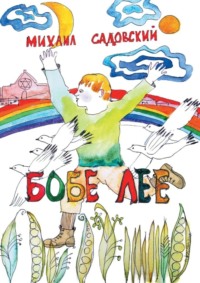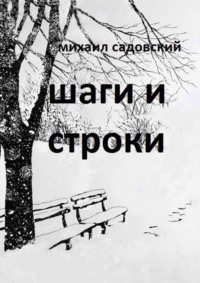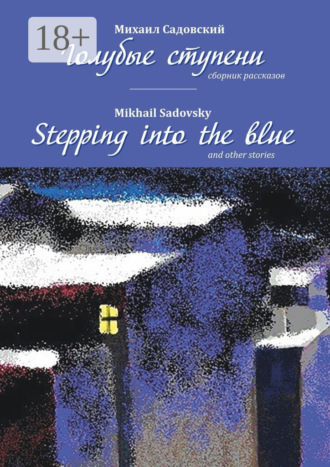
Полная версия
Голубые ступени / Stepping into the blue
«It was a cloudy day back then too, and you were in a hurry, as always, and I had to get to the village. We never had time to be together back then. Still, thank God, we lived fifty-six years together, if you count the eighteen you spent in prison. But of course they count! If we hadn’t been waiting for each other all those years, we might not have survived.
«It didn’t work out with the children, because of that. If we had had four or five, you wouldn’t have minded! I should say not! I know you! You were happy about that. But thank God He gave us two. We pulled through! You were either fighting or building, or in prison. And when you came back, I was oh so many years older – we won’t even count them.
«Of course it would have been nice if you’d waited for me. What were you in such a hurry for – to leave? You were always in a hurry! Hurry, hurry, hurry!
«It’s getting difficult for me to get here on my own. I won’t tell you about the children and grandchildren – you know everything anyway. But the great-grandchildren – well, those pishery (little scribes) – Ach, danke dir, Gotteniu! Alle gesund! (Oh, thank you God! All are healthy!)
«The rabbi said today that we should «love our neighbor as ourselves» – and that this applies most of all to people of the same profession. Like for a cobbler it’s hardest of all to love another cobbler, or a tailor to love a tailor – because of the competition.
«Well, what d’you know, he’s probably right, that young rabbi. He’s such a clever fellow. Of course, I didn’t tell him I was coming to see you. One shouldn’t break the sabbath, but I couldn’t do it any other day. It’s our anniversary today, not tomorrow, so I think He will forgive me.
«But you just tell me what I should cook for you today. Ninety’s not all that much when you can boil your own potatoes and go to the store for milk. Well, okay, they bring milk to me – potatoes too, and I don’t boil them for myself very often. That Gentile, Galka, cooks pretty good. But I can say what I think!…
«What are you so quiet for? You were always quiet – when you should have talked. And when you should have been silent, you would keep on wagging your tongue without stopping.
«No, I’d better go moisten my cloth – I don’t like the way you look.»
She headed over to the tap – they hadn’t yet cut off the water for the winter – and wiped the face in the photograph, just as she had wiped his face so many times whenever he came down with a temperature. And each time she did this, just like now, the same thought would come to mind: «And who wiped your face while you were in prison? You can’t tell me you didn’t come down with a temperature the whole eighteen years!»
She neatly folded the cloth, placed it on the pediment behind the granite headstone, then straightened up and whispered directly to his face: «Konnst schon ein bissel rucken – ich welt sein bald – ja, ja! (You can start moving over, I won’t be long now – yes, yes!)»
The light had already dimmed quite a bit, and the workers who had passed by her quite a few times in their mini-truck decided they ought to tell Filippovich13 that this old woman had been sitting a long time there without moving. At first she had been chattering away and swaying back and forth the way all Jews did, but now she was sitting there stock still, like a statue. Who knows whether she might have died right then and there – it was pretty cold.
Filippovich let out an oath, pushed the table away with his bulging belly, and got up with a groan. As he ambled along the central allée he thought: everybody dies the same death. Still, it was rare for people to go together. It was always a lot harder for the one left behind.
«There she is!» whispered a voice from behind his back. The worker who had been trailing him pointed. «She just sits herself there and don’t budge.» Filippovich paused by the low fence and coughed. The old woman wasn’t even moving a muscle.
«Hey, lady!» Filippovich called out softly, but with no response. «Hey, lady! The grounds are closing. Do you need help?» He was starting to get involved – you could hear it in his voice.
The old woman slowly turned her dark face toward him and tried to get up, leaning on her walking-stick, but she couldn’t move.
«Give us a hand here!» Filippovich gestured to the man behind him, and the worker, wearing a warm jacket, stepped out from behind his back.
«I’m all stuck here. Can’t do it!» he explained. Then the rotund Filippovich, who had a hard time bending over himself, leant forward and tried to take hold of the old woman’s elbow. She managed to get up, only to drop back to the bench.
«Hoo, boy!» By this time he was really upset, not so much because of the elderly woman’s infirmity as the unexpected challenges that had come his way. «How come you’re all alone here, and on the Sabbath yet?»
«No matter,» came the reply. «I’ll get up. I’ll get there. I wanted to do it on my own, ’cause…» She was wondering whether it was worth the effort to continue speaking, when Filippovich interrupted her:
«And at your age!»
«At my age I can do everything! I can go for a walk alone at night, even on the Sabbath!» Suddenly she gave a start and took a first step.
«Aha, it’s comin’!» the worker chortled. «Well, now, granny! How many years you got under your belt?»
«Ninety,» she answered, to the amazement of all.
«How many?» Filippovich echoed.
«You don’t believe me?» After a pause, she added: «It’s exactly seventy years today that we’ve been… like together.»
«What do you mean, ’like together’?» Filippovich marvelled, looking at the dates on the headstone.
«You don’t know how to count! Can’t count! Those years that went by – every one of them counted as two. So they add up to many more!»
While she felt a swelling in her legs, and wondered whether, indeed, she would make it home now, she was nevertheless completely free of not only fear but even concern. True, the thought did cross her mind that once at home she might go crazy, but since that had happened a number a times already, she dismissed it with a wave of her hand. In any case, she had done everything right. They had been so little together in life that Ziama was probably in full agreement with her.
«Bring the three-wheeler, on the double!» Filippovich barked, and the worker quickly set off back down the allée. He presently returned with a rattling three-wheeled mini-truck sporting a fresh mat on the seat of the cab.
«Okay, granny, get in!» the worker chortled, and he and Filippovich lifted the old woman over the low running-board and sat her down on the seat of the cab.
«Head for the office!» Filippovich commanded as he started to follow them. Upon reaching the office the woman waited until he could catch up with them and help her out.
It took them quite a while to decide what to do next. She flatly refused to take a taxi, asking only that they accompany her to the bus stop. After extensive negotiations she finally agreed that Filippovich could take her as far as the trolleybus near her home, as it was on his way, but after that she would be on her own.
«My grandson wants to write the story of my life,» she told him as they drove. «I tell him there’s no point: we all lived the same kind of life, nothing special, and the fact that I’ve managed to stick around longer than others in this world, well, it still remains to be seen whether that’s an advantage.»
«Mm-hm!» sighed Filippovich, and took a good look at her. «You don’t look a day over seventy! You’re sure you’re not kidding me?»
«What for?» the old woman asked in surprise. «Just think: I was born when Alexander III was on the throne – I was born in the residency perimeter.»
«And what might that be?»
«What was that? A za jahr af mir! (I should have lived like that!) What was that, indeed? A perimeter for Jews.»
«What kind of perimeter?»
«Designating where we could live, where we couldn’t!»
«Some kind of border?»
«It’s obvious, isn’t it – you have to agree I’ve got to…»
«Got to do what?»
«Tell my story, of course! Seeing youngsters like you don’t know anything! Where did you go to school?»
«I graduated from the Bauman,»14 Filippovich boasted.
«What’s that supposed to mean?»
«I was an engineer!»
«An engineer, and here you’re looking after a cemetery?!»
«Gelt (Money),» was Filippovich’s only answer.
«Maybe you’re Jewish?» queried the old woman in amazement.
«No, I’m just a regular guy. You think Jews are the only smart people?» Filippovich took offense. «Don’t you remember it all?»
The old woman didn’t answer for such a long time that the driver was already starting to get concerned and stole a glance over his shoulder.
«The things I remember – well, they’re better to forget,» she said quietly. «Back then I could have been sent to jail just for talking about them. Even now they still won’t publish my memoirs. Why get my grandson all worked up about it? Better they go to the grave with me. He’s not to blame that I’m his grandmother!»
«Know something? I’m going to drive you right home! Where are you headed? It’s dark out, and with those legs of yours?»
«No,» the old woman protested. «I ought to get home on my own. That’s the way it should be. Besides, I owe it to him.»
Filippovich didn’t understand who the «him» referred to, but he wasn’t about to ask for clarification. He let her off at the stop, helped her on to the trolleybus, and then spent a long time just standing there, reflecting on what had happened and envying a grandson he had never met. There weren’t any elderly relatives in his life. They were all dead and buried – either in battlefields far away on the western front, or in the Siberian labor-camps far to the east, and nobody could even tell him where to find their graves.
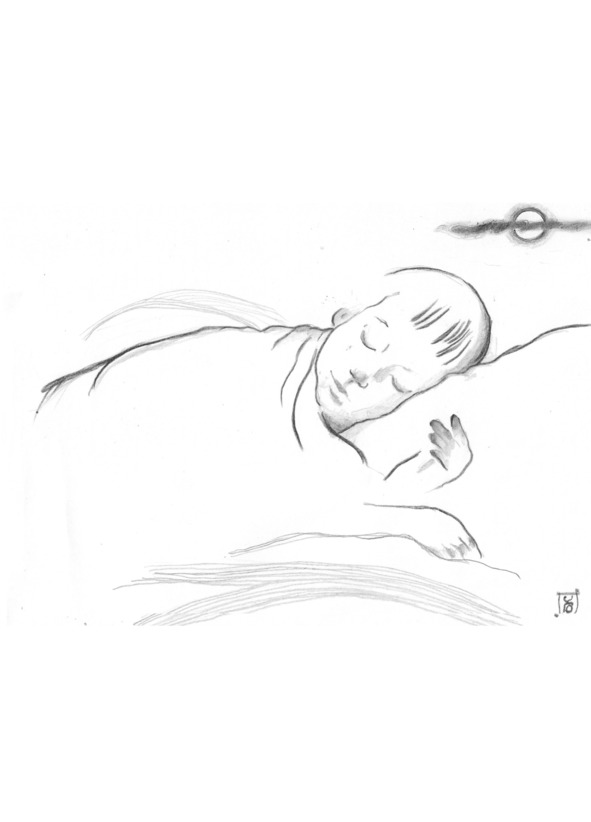
Спи, Малыш
Спи, Малыш, спи… Эта вечная луна тихонько положила на пол квадрат окна, часть его оказалась на кроватке и согнулась вместе со свисающим одеялом. Он сидел рядом на стуле уже который час, наклонившись вперёд и положив руку на маленькое горячее тельце ровно между лопаток. Вторая рука его свисала с распущенной ладонью и полусогнутыми пальцами.
«Вся усталость и боль стекают вниз, вниз по этим пальцам», – мысленно повторял он, как учили мудрецы ушу. И в полудрёме усталости ему представлялось, что он насос, и рука, лежащая на этом тельце, втягивает всю болезнь в себя, а потом жар и боль стекают на пол по другой, опущенной руке, перемешиваются с лунным светом, растворяются в нём и исчезают.
Пространство становилось бесконечным, глаза закрывались, и ему казалось, что это уже он сам много, необозримо много лет назад лежит с раздутой от свинки перевязанной щекой на старом топчане в угловой комнатке у добрых знакомых в доме, один – с самого дорассветного утра и до позднего вечера. Непереносимо хочется есть, но он знает, что кроме двух кусков чёрного клёклого хлеба ничего нет в тумбочке на кухне и что, если взять в рот кусочек и попробовать жевать, побежит обильная слюна и так заломит в скуле под больным ухом, что нужно будет обязательно выдохнуть какой-нибудь звук, чтобы с ним вместе утекло немножко боли, а потом придётся судорожно глотать воздух, чтобы не задохнуться от его нехватки. И от этого движения в горле станет опять невыносимо больно – так, будто голова треснула и в эту щель всаживается боль, похожая на проволочную сетку, которой моют почерневшие на керосинке кастрюли.
Поэтому он лежит тихо и постанывает изредка от жалости к самому себе и оттого, что время болезни неудачно, потому что на дворе весна, и скоро день рождения, и ручьи такие замечательные бегут, и солнце такое тёплое и безотказное – греет и греет, сколько ни подставляй ему лицо и шею. Тогда все они, мальчишки, садятся в ряд на пустыре на гнилое влажное бревно, подстелив обрывки старых дерматиновых сумок и уже высохших газет.
Он не ждёт. Дремлет в бесконечном дне, отрывается на момент от липкой дрёмы и снова тонет в ней, не поворачиваясь и не шевеля даже пальцами, потому что всё вызывает острую боль. И ещё терпит, терпит до последнего момента, пока, кажется, сейчас лопнет живот, и тут уж, невзирая на колотьё и кружение головы, держась за стенку, босиком по холодному полу стремится в туалет и долго, долго стоит над ржавым унитазом, в котором струится вечный ручеёк. Потом, продрогнув, летит, лёгкий и почему-то радостный, в свою остывшую постель, поджимает ноги, сворачивается калачиком и замирает: наступает расплата. Тиски боли безжалостны, и ему, чтобы одолеть их, надо, главное, не шевелиться, а это так трудно, когда болит… Он закрывает глаза, и снова благостная дрёма забирает его голодное обессиленное тельце.
Но он всё слышит и незаметно начинает ждать, потому что смеркается, где-то далеко хлопают двери, звонки ждут ответа, чья-то речь тревожит нетронутое безмолвие целого длинного дня.
Это самое радостное время, когда возвращается мама, когда не страшна никакая боль, когда совершенная правда, что скоро выздоровеешь, чему не верилось и сегодня утром, потому что боль никак не проходит пятый день… или шестой? Просто он сбился со счёта… А она придёт, подоткнёт одеяло, положит шершавую холодную ладонь на лоб, и они оба замрут на минуту, такую долгожданную и сладкую. За эту короткую минуту боль неожиданно сморщивается, и уже можно проглотить тарелку ненавистной, несмотря на жизнь впроголодь, манной каши из неизвестно где добытой крупы, без молока и масла. Но он тогда не знал или забыл, что их положено добавлять в эту кашу, и тогда она становится ужасно вкусной, не комковатой и не заклеивающей горло.
А потом уже, совсем перед тем, как ночь опять разъединит их, мама садится рядом и кладёт руку на его спину, и он сквозь одеяло чувствует тепло этой руки и слышит, уже против воли уплывая в мир сна: «Спи, Малыш, спи…».
Ему хочется ещё раз услышать это. Ещё. Ещё разок… Но сладкий мартовский воздух, льющийся через форточку, совсем опьяняет и смаривает его. Сон… Сон, глубокий и бесконечный. И по этому воздуху, прописанному врачом как единственное лечение, потому что усиленного питания взять негде, он уплывает в своё ещё более раннее детство – грохот бомбёжки, усталые теплушки, горящие от немецких фугасок-зажигалок, колёсный пароход, кренящийся набок от сгрудившихся эвакуированных, стремящихся к берегу, в тишину полумёртвой, переполненной беженцами деревни, под ночную необычайного размера и красоты заволжскую луну, от которой ни спасу, ни предела.
И так круг замыкается. Он медленно и нехотя выплывает в свой нынешний мир из полудрёмы – мир, который никому не доступен и не дорог так, как ему. И только одного человечка хочет он впустить туда и жить там с ним вместе, не потому, что в мире этом уютно, сытно и безопасно, а потому, что он знает, как провести по нему своего дорогого Малыша, чтобы наполнить его добротой и неопределяемым чувством – умением ощущать близких, где бы они ни находились и о чём бы ни думали.
«Спи, Малыш, спи. Жар утекает из тебя через меня, и лунный свет не будет жёстко очерчивать тебя и не будет вытягивать из привычного мира». Этот свет умеет быть ласковым и добрым, как горячее молоко с маслом, убивающее свинку. Он не знал, что его можно не любить, это молоко, потому что давно не видел масла, а маргарин и лярд совсем не похожи на масло. Он никогда не пил такого, а сегодня соседка принесла пол-литра в банке и кубик масла. И банка, покрытая вощёной бумажкой, с этим кубиком на ней, завёрнутым в такую же бумажку, стояла между рамами окна – в самом холодном месте – и ждала вечера, когда мама подогреет в кастрюльке с ручкой, нальёт в чашку душистое молоко и осторожно опустит в него четверть кубика, а потом ещё твёрдого, как жмых, мёда, неизвестно где добытого.
И это всё надо выпить, торопясь от голода, обжигая губы и стараясь не торопиться, чтобы растянуть удовольствие. Но вдруг остановиться в ужасе от того, что натворил, и спросить совершенно упавшим от стыда голосом: «А ты?». И не соглашаться, не соглашаться – ни глотка! Ни глотка больше! «А ты?» Вот совсем темно, и теперь, после внезапного пробуждения, выпитого молока, благословенного тепла и прилива жизни, дарованного этой чашкой, сон совсем неодолим. Ты снова подтыкаешь под спину одеяло, и накидываешь сверху своё старое, пригодное только для огородного пугала пальто, и невыразимо сладко, врачующе шепчешь: «Спи, Малыш! Спи!».
Там, только там, у себя внутри, он может погрузить его во всё это, чтобы он вырос навсегда почувствовавшим этот вкус простых слов, выпив его вместе с молоком, – похудел, вытянулся, встал после изматывающей болезни немножко другим. Немножко. Без всяких пролетающих мимо воспитывающих запретов и разрешений, вырос политый этим лунным светом, растворяющим боль и радость, без которых в их собственной междоусобной борьбе и поочерёдных победах ничего не бывает настоящего – такого, как «спи, Малыш!».
«Спи, Малыш! Спи! Во сне всё проходит. Луна не втянет тебя в свои безумные игры… Когда твоя мама была как ты, я бегал по городу и добывал ампулы, чтобы спасти её!..»
И он снова свалился в ту дрёму, которая их объединяла сегодня. Необозначенные дороги прихотливой памяти приводили его на забросанную снежной грязной кашицей улицу среди старых домов, повидавших жизнь ещё до разгула люмпенов и затаившихся после, а потом неожиданно состарившихся, когда рухнули все надежды. По этой улице – в аптеку, где в подвалах ещё хранились вычурные пузырьки от микстур и оподельдоков прошлого века, там через боковую дверь без вывески – с зажатыми в кулаке в кармане одолженными пятнадцатью рублями в контору управляющего, по тёмной скрипучей деревянной лестнице – на второй этаж, сквозь неистребимые запахи борьбы, которые распространяют все пузырьки, коробки и таблетки в аптеках в любом конце света. Тот напряжённый вопрос и надежда, засевшие в одном необходимом сейчас имени и отчестве, и отпускающая радость, что он на месте – спаситель. Будто уже отступила болезнь… Нет. Вот они, три выданные грамма надежды, запаянные в островерхое стекло и уложенные в коробочку с импортным названием, тоже подтверждающим силу средства и оправданность усилий. Домой, скорей домой!
Он летел, не ощущая промокшие ноги, вспотевшую спину и прилипший к шее шарфик в ту ночь, которая была наполнена одним стремлением и просьбой: «Спи, Малыш, спи!». И под рукой ощущалось, как отвергало после укола лихорадку щуплое тельце, плотнее ложилось на залитую лунным светом кровать, словно отдавало ей последние остатки болезни, которой бесполезно было рваться в другую атаку, потому что прозвучало уже рубежное слово «кризис».
Тогда ночь умещалась в такой маленькой и тесной комнатке, что невозможно, некуда было спрятаться от всего, что она предлагает и навязывает: все страхи, насморки духоты, шорохи мышиных вылазок и тревожный звон тишины, топот сердца, перемешанный с гулкими басами радиолы из соседнего подъезда, – всё это не смогло заслонить легко обозначенного звука ровного младенческого дыхания. И та же усталая рука, уже не сопротивляясь, а затекши на весь остаток ночи, как проводник, передавала тебе однажды сказанные слова: «Спи, Малыш. Спи!».
Он смотрел на него, ещё не совсем вернувшись из дрёмы, как бы остановясь передохнуть на полпути, смотрел раскрытыми глазами и боялся шевельнуть даже пальцами – удивительно и неразделимо слились все они, самые близкие, в один образ, втиснулись в одну неразрываемую оболочку, нисколько не постаревшую и не изменившуюся за столько десятилетий, сквозь войны, узурпацию власти, геноцид, обман, отрицание веры и океан лжи, вечной, необъятной и неистребимой…
Тут, в лунном сумеречном свете, ему показалось, что он увидел мелькнувший профиль маминого лица, прильнувшего к ним троим и вдруг растворившегося в них, будто втиснутого сквозь их живую общую кожу. Он вздрогнул и уставился на сползшее далеко влево светящееся пятно, почувствовал, как горяча и потна его ладонь на тёплом, мерно вздымающемся и опадающем с каждым выдохом тельце. Сквозь стекло было видно, что ночь растеряла звёзды и медленно отступала перед рассветом.
Заскрипела кроватка, одеяло сползло одним углом на потемневший безлунный пол… Тогда он встал и, не боясь заскрипеть шагами, направился к двери, обернулся в её проёме и негромко сказал: «Спи, Малыш! Спи…» – потому что был уверен: и на этот раз он победил.
Sleep, my Little One
[Spi, malysh]
«Sleep, my Little One, sleep…» The everlasting moon silently casts the rectangular shape of the window onto the floor – part of it can be seen bending with the blanket which hangs down from the little bed. He has been sitting in the adjacent chair for goodness knows how many hours, leaning forward and laying his hand on the feverish little body just between the shoulder-blades. His other hand hangs down at his side, palm loosely open and fingers half-curled.
«Let all that weariness and pain flow down, down through these fingers,» he keeps repeating to himself, as the Wushu masters15 once taught him. And in his half-conscious drowsiness he imagines himself to be a pump, and that his hand lying on the little one’s body is draining away all the disease into itself, and then the fever and pain are flowing down through his other, drooping hand right down to the floor, where, mingling with the moonlight, they dissolve and disappear.
The space around him seems to expand to infinity, his eyes close, and now he sees himself, more years ago than he can count, lying on an old hospital-type bed, his bandaged cheeks puffed out with mumps, in the little corner room of a neighbor’s apartment, all alone from before sunrise until late into the night. His feeling of hunger then was unbearable, but he knew that, apart from two little pieces of sodden black bread there was nothing to eat in the kitchen, and that any attempt to put one of those pieces into his mouth and chew would only be followed at once by a steady stream of saliva, which would gnaw at his cheek-bone right below his aching ear, making him exhale noisily just to ease his pain a bit, and then he would have to go into convulsions and take in gulps of air so as not to choke from asphixiation. And this movement in his throat would again become unbearably painful, as though his head were cracking open and the pain were settling into the crack, just as prickly as the wire brush his mother used to wash her kerosine-blackened pots.
So he would lie still and allow himself from time to time to let out a wee little groan of self-pity. He had picked a fine time to get sick – outside the window spring had already arrived, and soon it would be his birthday, and the streamlets would be running their charming little courses, and the sun would be shining with its unrelenting warmth, and keep on shining and warming no matter how long you exposed your face and neck to its rays. Then all the little kids would go and sit in a row on the old damp log at the sand-lot, planting themselves on scraps of old leatherette handbags and dried-up newspapers.
There was no anticipation for him. He dozed on through one unending day, momentarily waking from his dank drowsiness only to immerse himself in it once again, not daring to turn over or even move his fingers – actions which would only provoke acute pain. And he would put up with it – he would put up with it until the very last moment when it seemed his stomach would burst, and never mind the throbbing and spinning in his head, he would make his way across the cold floor, hanging on to the walls, to the bathroom, and stand for what seemed forever over the rusty toilet bowl with its steady trickle of water. Then, feeling a sudden chill, he would go lightly tripping with an inexplicable delight back to his now-cold bed, tuck in his feet, curl up and practically faint – now he had to pay the penalty. Pricks of pain came one after another with relentless cruelty, and his only defense was to lie completely still, and that was so hard when everything hurt. He would close his eyes, and again his hungry, exhausted little body would be swallowed up in a soft and pleasing drowsiness.
Конец ознакомительного фрагмента.
Текст предоставлен ООО «Литрес».
Прочитайте эту книгу целиком, купив полную легальную версию на Литрес.
Безопасно оплатить книгу можно банковской картой Visa, MasterCard, Maestro, со счета мобильного телефона, с платежного терминала, в салоне МТС или Связной, через PayPal, WebMoney, Яндекс.Деньги, QIWI Кошелек, бонусными картами или другим удобным Вам способом.


